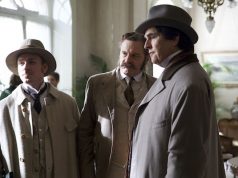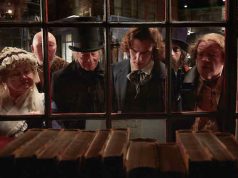Truman Capote was the quintessential man-about-town. He graced New York’s upscale bars and cafes with his witty presence through the 1950s and ’60s, telling stories, cracking jokes, and drinking, always drinking. He was a successful writer (his work included the novella that “Breakfast at Tiffany’s” was based on), but by the time he went to Kansas to research the story that would become “In Cold Blood,” he had reached true celebrity status: famous just for being famous.
“In Cold Blood” would ultimately destroy him, and the riveting new biopic “Capote” shows how the seeds were sown. Capote let the story intertwine with his own so deeply that it became impossible to continue one without first finishing the other.
When we meet Truman, played with uncanny precision by Philip Seymour Hoffman, he is a fey, impeccably dressed sprite with a marble-mouthed whine for a voice and a tongue whose tartness knows no limits. It is 1959, and Truman is looking for something to write about for The New Yorker. He spots a story in the Times about a family being found brutally murdered in their quaint Holcomb, Kan., home. He perceives a story here — not a sensationalistic one, but a human one. Surely Holcomb, Kan., does not see many murders. Surely there is insight into the American condition to be found in a tragedy in the nation’s heartland.
He heads to Holcomb accompanied by his lifelong best friend Nelle Harper Lee (Catherine Keener), whose “To Kill a Mockingbird” will be published soon. (Truman Capote and Harper Lee being friends is one of those surreal circumstances that can only come from real life, because no one would believe it otherwise.) Truman doesn’t seem to sense the importance of Nelle’s companionship in Kansas, but we do. Where he is utterly alien in Holcomb, with his fancy scarves, high-falutin’ language and exceedingly gay demeanor, Nelle is more able to adapt. People are suspicious of Truman, but people like Nelle.
But it’s Truman’s fame as a writer that gets them through an important door: the one belonging to local sheriff Alvin Dewey (Chris Cooper), whose wife Marie (Amy Ryan) is a big “Breakfast at Tiffany’s” fan. Soon Truman is holding forth in the Dewey home with as much boisterous charisma as he did in New York, subtly winning favor with the sheriff and picking his brain for details about the murder investigation.
That craftiness of Truman’s, combined with his alleged 94-percent recall ability that enables him to accurately transcribe his interviews without taking notes, makes him a consummate reporter. It also puts him in intimate, friendly contact with the subjects of his reportage — including, as it turns out, the two men convicted of the murders, Perry Smith (Clifton Collins Jr.) and Richard Hickock (Mark Pellegrino).
Truman becomes especially connected to Perry, the more articulate and of the two, depicted here as a shy, soulful man who, one gathers, fell in with the wrong sort of companion in Hickock. When Truman visits them in prison, he brings Perry books and Hickock porn.
Once convicted, the killers don’t deny their guilt, but they fight ardently against the death penalty being administered. Truman helps them find a more competent lawyer for their appeals and stays of execution, but then Truman himself runs into a problem: He can’t finish the book he’s writing about all of this until the story has an ending. And the story doesn’t really have an ending until the murderers are put to death.
All of this happens through the lens of a spot-on performance by Philip Seymour Hoffman, which you have probably already heard about. You’re going to hear more about it, too, when the Oscar nominations are announced, and in the next sentence.
Hoffman has appeared in some 35 films in the past 15 years, garnering acclaim in certain circles for some of them (“Boogie Nights,” “Magnolia” and “Owning Mahowny”) but mostly gliding unnoticed along the public radar. All of that will soon change, as “Capote,” once it is widely seen, will make him a household name.
Even viewers too young to remember the real Capote from his legendary early-’70s “Tonight Show” appearances can see that Hoffman is doing brilliant work here, not just in impersonating the man (though that is eerily well-done too), but in developing him into a full-fledged character, with subtleties, depth and motivations.
Truman has a theatrical flair for language and storytelling that makes people love him, but he’s also piteously self-centered, neglecting both Nelle and his longtime partner Jack (Bruce Greenwood) while spending year after year on the Kansas story. Does he fall in love with Perry Smith? He seems to. But he lies to him, too, telling him he hasn’t yet conceived a title for his book when he actually has: “In Cold Blood.” But you can’t tell your friend that you consider him a cold-blooded killer, can you? Not if you want him to keep thinking you’re a lovable man-about-town, you can’t.
Many film biographies fall short because of the attitude that audiences should care about the film simply because its central character was a real person. These movies often deify the person, or at least to use his flaws as a brush with which to highlight his underlying nobility. Not so with “Capote” (which was directed, astonishingly, by Bennett Miller, whose only other credit is a 1998 documentary): Truman, like so many of Hoffman’s characters, is more deeply screwed-up than that. He’s a selfish jerk, so desperate for the world’s affection that he comes to believe he deserves it no matter what the cost. He’s not noble at all.
“Capote” is also wise not to attempt the telling of Truman’s entire life, which ended in 1984 after a long, fruitful relationship with drugs and alcohol. Instead, Dan Futterman’s adaptation of Gerald Clarke’s biography focuses on the years during which he researched “In Cold Blood,” giving us a traditional storyline with a beginning, a middle, and a very sad end.
B+ (1 hr., 38 min.; )





